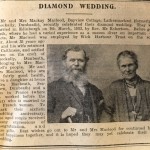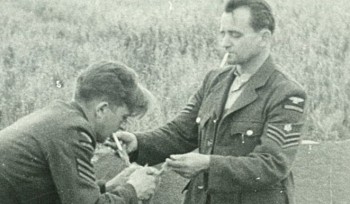
In North Africa, Allied forces in Tunisia continued to push the German and Italian armies back. On 30 March the decision was taken to suspend Allied convoys to the Soviet port of Murmansk because of heavy losses, much to Stalin’s fury. And on 4 April ten American POWs escaped from a Japanese camp on Mindanao, bringing news of Japanese atrocities.
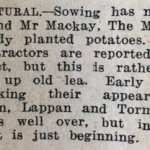 The John O’Groat Journal reported that Dunbeath, farmers were sowing and some were already planting potatoes. “The Government tractors are reported to be in the district, but this is rather late for ploughing up old lea [an open area of grassy or arable land].” The lambing season was now underway as well: “At Knockinnon, Lappan and Tormore farms lambing is well over, but in the later districts it is just beginning.”
The John O’Groat Journal reported that Dunbeath, farmers were sowing and some were already planting potatoes. “The Government tractors are reported to be in the district, but this is rather late for ploughing up old lea [an open area of grassy or arable land].” The lambing season was now underway as well: “At Knockinnon, Lappan and Tormore farms lambing is well over, but in the later districts it is just beginning.”
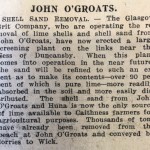
Also in the paper was news of the systematic removal of shell sand from John O’Groats and the construction of a large refining plant at Ness of Duncansby. “The shell sand from John O’Groats and Huna is now the only source of lime available to Caithness farmers for agricultural purposes. Thousands of tons have already been removed from the beach at John O’Groats and conveyed by lorries to Wick.”
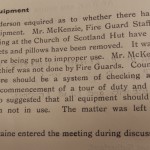
Wick Burgh Council was concerned about fire guard equipment. At a meeting on 29 March, “Mr McKenzie, Fire Guard Staff Officer, stated that beds and bedding at the Church of Scotland Hut have been damaged, and that two blankets and pillows have been removed. It was also reported that steel helmets are being put to improper use.” The Council suggested that the equipment be kept “under lock and key when not in use” and there the matter rested.
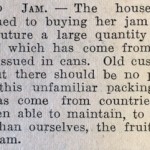
The John O’Groat Journal prepared its readers for another shock, with jam in future being sold in cans instead of jars. “Old customs die hard, but there should be no prejudice against this unfamiliar packing. Some of it has come from countries which have been able to maintain, to a higher degree than ourselves, the fruit content of the jam.”
Finally this week, the John O’Groat Journal celebrated the diamond wedding of Mr and Mrs Mackay Macleod of Bayview Cottage, Latheronwheel. Married in Edinburgh in 1883 the couple came to Caithness 35 years earlier and originally lived in Mrs Macleod’s family croft at Knockally, Dunbeath. Their son had settled in France before the war broke out, and now risked his life with the Resistance helping Allied soldiers to escape. As the paper said, “Best wishes go out to Mr and Mrs Macleod for continued health and happiness together.”